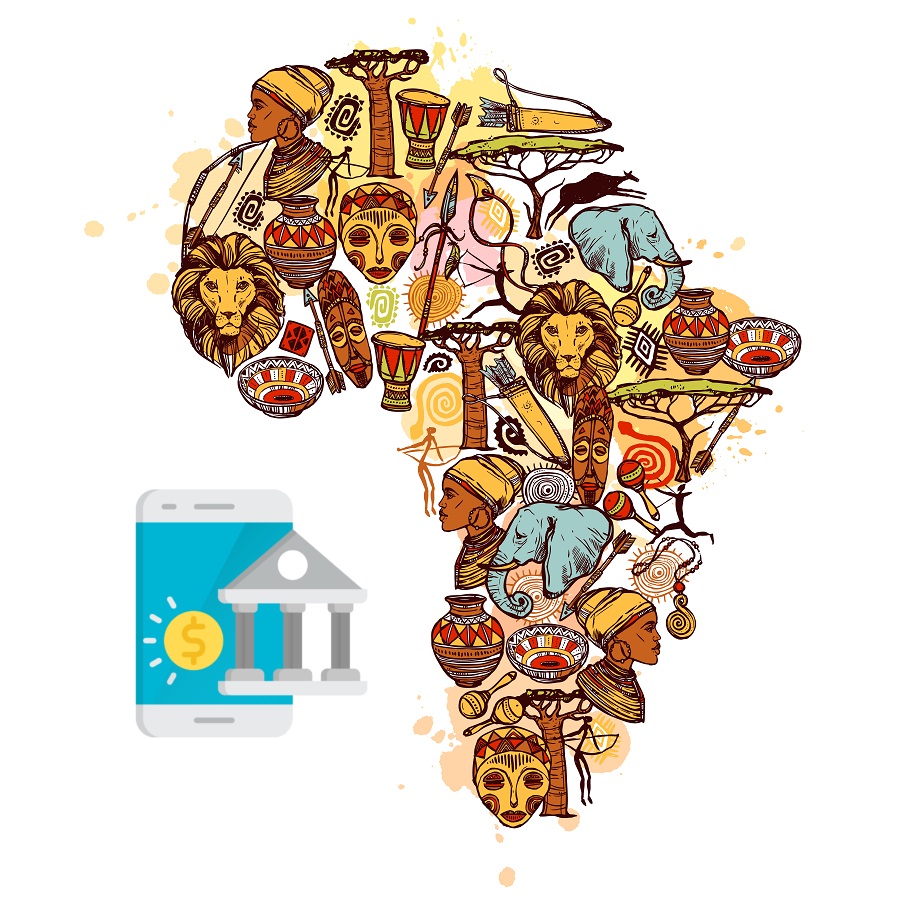Financial inclusion implies that both people and companies can meet their needs through useful and affordable financial products. It is a priority that is becoming more important every day among authorities, regulatory and global development organizations. In fact, it has influenced 7 of the 17 Sustainable Development Goals proposed by the United Nations.

Being able to have access to a transaction account is a first step towards broader financial inclusion, and Fintech alternatives are establishing themselves as a vehicle to promote the economic development of many countries.
Africa has been a clear example of this. In Côte d’Ivoire, Somalia, Tanzania, Uganda and Zimbabwe, more adults have a mobile account than have one at a financial institution. In fact, in Sub-Saharan Africa, 12% of adults have a mobile account in 2016 ( 64 million people), 10% more than in the rest of the world (2%).
Beyond the M-Pesa application that has conquered Kenya, there are several fintech startups that are successful on the continent. Let’s see a little more about their influence on the economic growth of the region.
WHY MOBILE PAYMENTS ARE GROWING SO MUCH IN AFRICA
Paying, saving and getting paid from your mobile phone has opened many doors for Africans, allowing them to pay electricity bills, water bills, school bills, grocery shopping, and any other expense with a text message.
Among the impediments to the use of traditional banking in Africa, the statements made by citizens of the region to the La Vanguardia portal highlight the following:
- Lack of trust : they allege that banks ask for a lot of data and do not view foreigners favorably.
- Limited access to branches : bank offices or ATMs are usually few and far between. On the other hand, mobile transactions are easier and faster.
- Mobile money is the new game in Africa and can be used for everything . Our popular Kash Kash application allows you to make payments with complete ease in multiple countries in Africa
According to the GSMA report , for 2018 the global outlook for the growth of the mobile money industry was as follows:
With more than USD 1.3 billion processed per day today, the mobile money industry added a record 143 million registered customers in 2018.
The sub-Saharan region was the one that registered the greatest growth; There were 395.7 million registered accounts , carrying out some 1.7 billion transactions between 2017 and 2018, for a total value of USD 26.8 billion.
The possibility of fintech companies providing formal lending opportunities and basic transaction services to reach those who have been marginalized by traditional banking and anyone who is attracted by the attractions of mobile money is becoming increasingly evident.
WHAT DOES MOBILE MONEY MEAN FOR AFRICANS?
In countries like Kenya, the percentage of those who use these services is very high, in this way almost 40% of people can access financial services that they would not be able to access otherwise.
Seen in this way, the positive impact that mobile banking has had in this region is evident, being more than a payment method, an instrument that makes possible what seemed impossible, access to specialized services in places where it is not possible. There are other options.
Among the many benefits of mobile banking in Africa, we include the following:
FEMALE EMPOWERMENT
In 2016, 40% of women around the world (more than one billion) did not have access to the financial system . While much work remains to be done to close the mobile money gender gap, it narrowed in 17 countries in sub-Saharan Africa in 2018, according to GSMA .
A clear demonstration that the implementation of new financial technologies not only offers opportunities among users with fewer economic resources, it also opens the way to favor change in the feminine, breaking with traditional structures in which the man of the house was the only one who He could manage the family economy.
South African Phumzile Mlambo-Ngcuka, executive director of UN Women, recently stated for La Vanguardia :
“More women in emerging markets are making payments and accessing vital financial services digitally, providing a safer and more efficient way to pay school fees, save and access credit; (Mobile money) allows them to plan their future financial needs.”
ECONOMIC DEVELOPMENT
Mobile banking options that allow you to send and receive small amounts of money from your phones have improved the economies of the nations in which they have been implemented. 2% of Kenyan households escaped poverty between 2008 and 2014.
Fast, affordable devices and greater access to robust mobile networks have seen African countries live in a new and improved reality where connectivity, information and other online resources are part of their daily lives. day.
EASY PAYMENT FOR SERVICES AND NEEDS
In Africa, the mobile phone has become a vital tool to make payments, collect payments, obtain financing, and access services such as investment and savings. This makes mobile money the most efficient, valuable, and accessible alternative available, compared to other methods such as cards or cash.
The possibility of carrying out transactions for small sums of money between individuals benefits both the sender and the receiver, promoting the growth of small businesses and local enterprises that do not have a banking network to support their operations.
ACCESS TO MICROCREDITS FROM YOUR MOBILE
The opportunity to access financing from a mobile phone deserves separate mention. Considering that in Africa access to official banking is more difficult than in the West, having small financing options such as microcredits is of great benefit for the economic development of Africans, especially considering that interest rates are much lower. than traditional alternatives . We provide that service through the Dakar bank’s CreditKash platform which can be downloaded on Google play as CreditKash Mobile Banking .
DIVERSIFICATION OF THE FINANCIAL LANDSCAPE
Although mobile money in Africa is dominated by large mobile operators, we see that in other parts of the world the technological giants are beginning to open their own space in this area, creating alternatives focused on the needs of users even through alliances with financial entities.
This means that the mobile money ecosystem is projected as the preferred option in the not too distant future in which the generation of multiple options favors its solid growth.
AFRICA AS A REFERENCE FOR THE DIGITAL TRANSFORMATION OF BANKING

In 2017, more than 90% of sub-Saharan Africa was covered by 2G networks, and more advanced mobile broadband networks are rapidly being deployed in these regions, where a third of mobile users, 250 million people, have a smartphone.
And every day more people in sub-Saharan Africa use mobile phones for financial transactions, being higher than the percentage of users who have already integrated these digital channels in Europe (where access and regular banking options are not a problem ), a gap that becomes significantly larger if we talk about it as the only financial tool used.
However, these types of services have already been implemented and continue to be implemented in the old continent, a change that occurs progressively as the new generations begin to be part of both the labor and financial markets, and the use of mobile As a tool to solve any need, it becomes an absolute reality. So, obviously, we are facing a huge potential global market .
Furthermore, understanding that Africa is made up of a young population that has embraced this digital transformation so well should serve as a prediction of the future for other financial markets. The new generation of clients demands instant, automated and online solutions, leaving aside bureaucratic methods full of restrictions.
There is no doubt that the advancement of technology in general has achieved unthinkable changes in all areas, and the economy was no exception. Both fintech leaders and startups continue to revolutionize the environment of financial inclusion, providing very useful and promising answers and opportunities for developing countries.